If you are interested in knowing the long-term results of the gastric sleeve, then you need to check out this article! In this article, we will touch on many important topics related to the long-term outcomes and expectations up to 10 years following surgery!
Table of Contents:
- What is the gastric sleeve?
- How much weight will you lose long term?
- Will you regain weight over time?
- What will your quality of life look like long-term?
- Potential long-term complications
- Determinants of long-term success
- Diet 10 years later
- Exercise 10 years later
- Vitamin needs long term after gastric sleeve surgery
What is the gastric sleeve?
The sleeve gastrectomy or gastric sleeve is a form of bariatric surgery that involves the removal of about 75-80% of the stomach. Once this portion of your stomach is surgically removed the remaining part of your stomach will be a tube-like structure or a “sleeve”. The gastric sleeve will be about the size of a banana and will hold about 5-6 ounces of food and/or liquids.
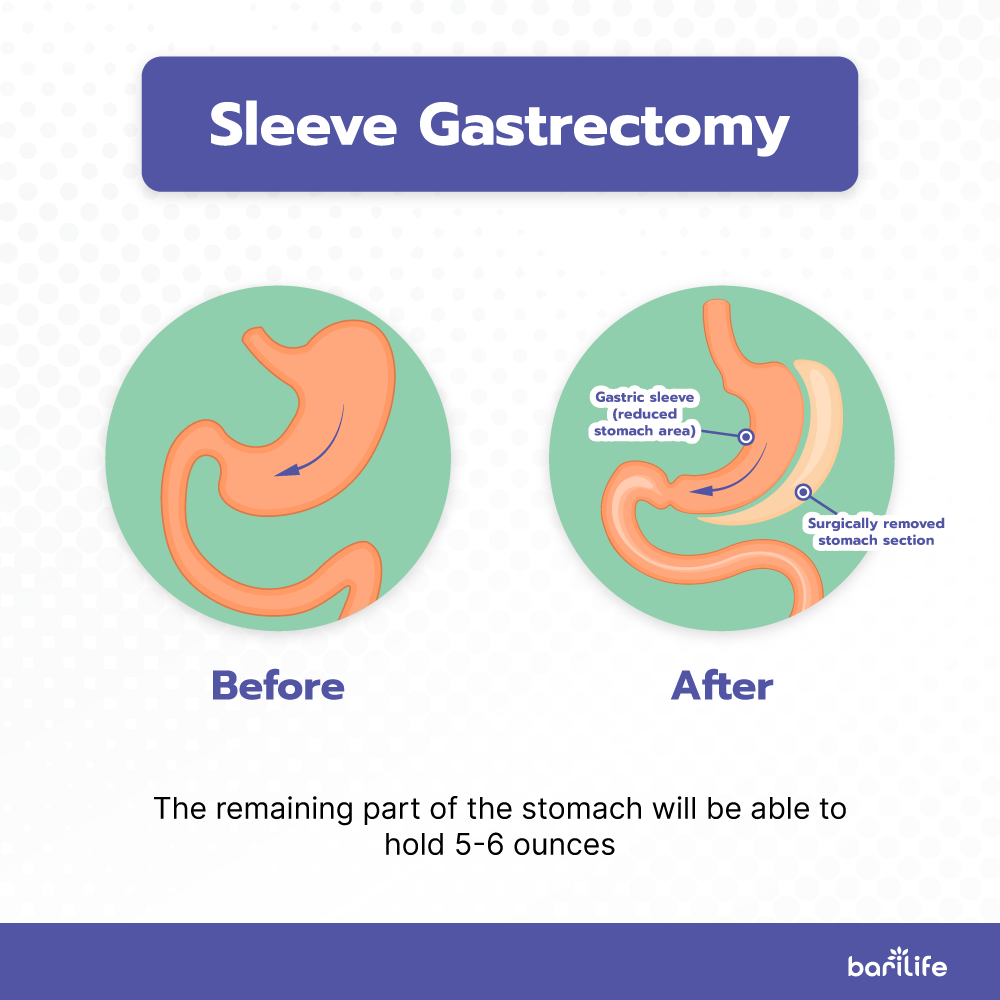
There are two primary ways that the gastric sleeve can promote weight loss and can help your body get its metabolism back on track. First, by shrinking the physical size of your stomach it reduces the amount of food that you can consume at each meal which leads to lower calorie and less food intake. And second, the removal of the outer portion of your stomach alters hunger-related hormones which can lead to decreased appetite and food intake.
As you may already know, the gastric sleeve can be a successful method in achieving considerable weight loss in a short amount of time, but the long-term results can be a bit more complicated.
There are so many benefits to the gastric sleeve procedure and sometimes these benefits may overshadow the fact that you will have to continuously work for the rest of your life to achieve and maintain your long-term weight loss goals.
How much weight will I lose long-term?
There are many differences between the short-term and long-term results of the gastric sleeve. Short-term weight loss can occur rapidly and with relative ease. However, long-term weight loss or prevention of weight gain can be more difficult.
One determinant of long-term success is a measurement called percent excess weight loss (%EWL) or the amount of excess body weight that you lose. Excess body weight is generally defined as the amount of weight that you have above your ideal body weight.
A study evaluating long-term weight loss following the gastric sleeve found that the average %EWL changed over the years. After 5 years the average %EWL was 62.3%, then 53.8% after 6 years, 43% after 7, and 54.8% after 8 or more years after the gastric sleeve.
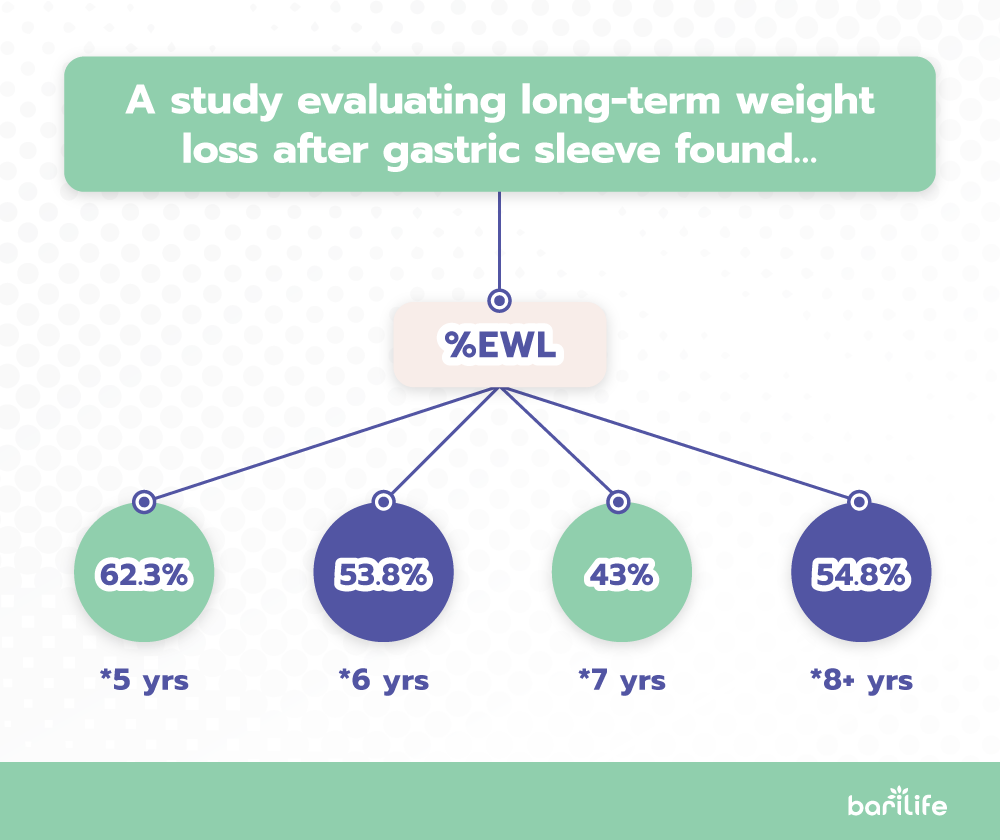
The overall average %EWL after 5 or more years was 59.3%.
Everyone’s %EWL will be different following the gastric sleeve and fluctuations in weight loss long-term are common. In research, it is considered good if someone can maintain greater than 50% excess weight loss, so the research study above suggests successful long-term weight loss.
Will I regain weight?
The simple answer is yes! You will likely gain some weight back after achieving their lowest recorded weight after surgery, but the amount that you regain depends a lot on your lifestyle and diet.

Research shows that long-term weight regain is estimated to occur in about 13-30% of patients after gastric sleeve. Research suggests that you can gain anywhere from 2% of your weight back to well over your starting weight.
Weight loss in the first 1-3 months can be a predictor of long-term weight loss. Early implementation of diet and lifestyle modifications is highly suggested for anyone that may be at a high risk of poor weight loss outcomes or weight regain.
Weight gain following the gastric sleeve is usually related to your compliance with diet and lifestyle factors.
What will my quality of life look like long-term?
Many studies have shown that the gastric sleeve has led to improved quality of life. There have been noted improvements in self-esteem, physical activity, and social life. One study published in the Journal of Obesity found that participants no longer reported difficulty finding clothes in their size and they also had a noted increase in self-confidence and self-esteem.
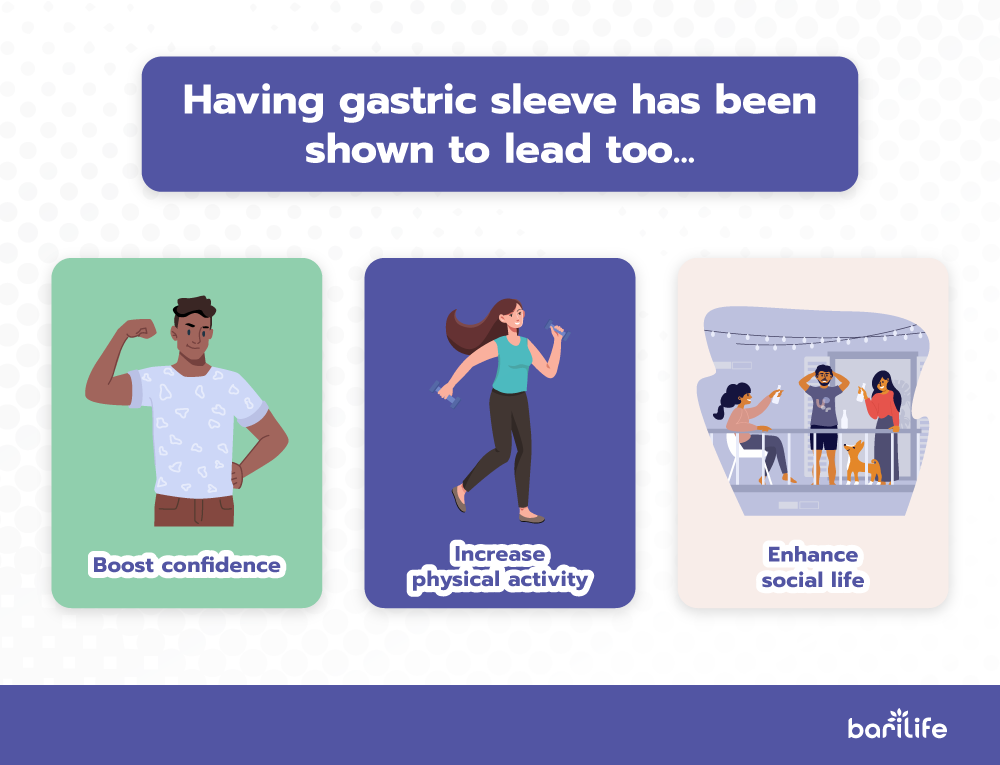
Another journal article by the International Federation for the Surgery of Obesity and metabolic disorders (IFSO) found improvements related to the dietary approach with participants reporting that food plays a less significant role in their lives after surgery. Improvements in energy and physical ability have also been reported. These factors can allow you to enjoy a healthier diet and lifestyle long-term following surgery.
Bariatric surgery can lead to benefits in both physical and mental health. However, it is important to note that everyone’s journey with bariatric surgery is different and everyone will experience their own unique set of benefits.
Long-term complications
Long-term complications can include:
- Nutrient deficiencies
- Leakage
- Dumping Syndrome
- Bowel obstruction
- Acid reflux
- Hernias
- Low blood sugar
- Gallstones
According to research, the most common long-term complications include acid reflux and gallstones. More severe symptoms like bowel obstruction, hernia, or leakage can occur but are less common.
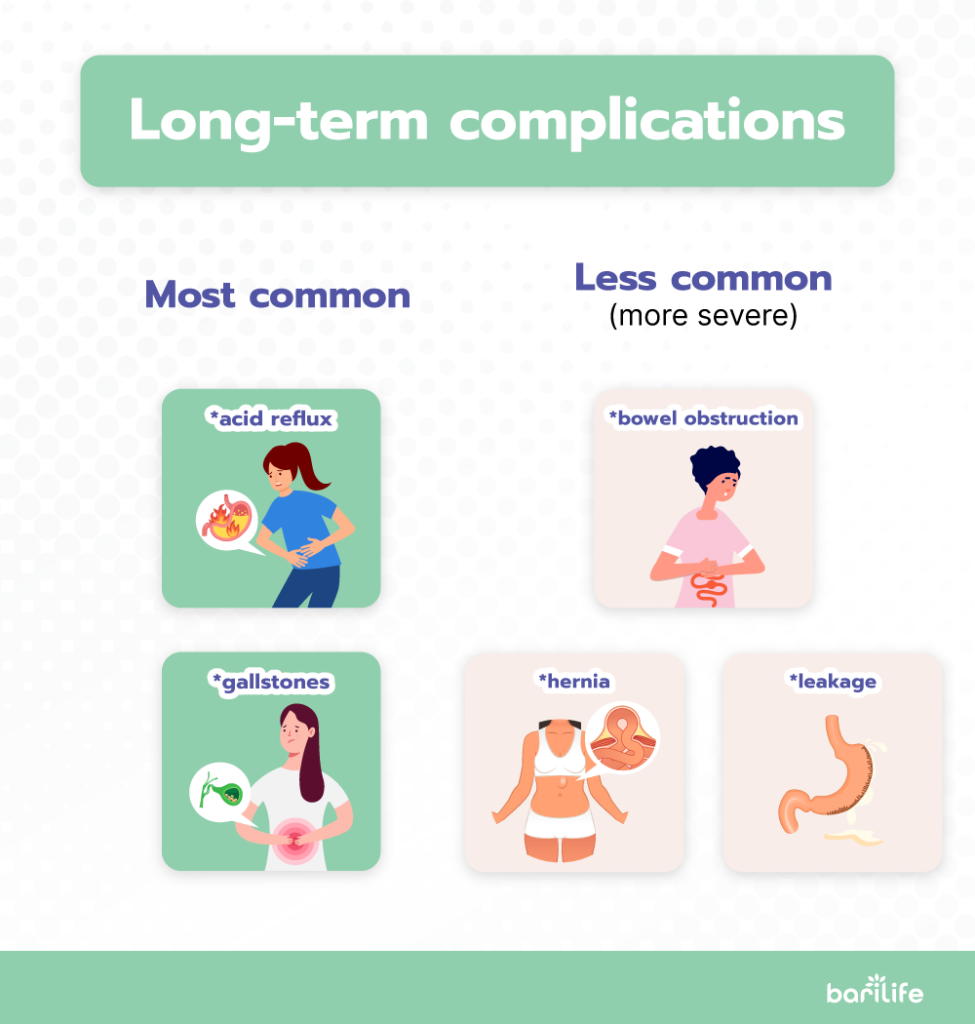
The symptoms related to severe complications can differ but if you experience any severe pain like sharp abdominal pain don’t hesitate to reach out to a physician and get it checked out.
Determinants of long-term success
Many factors can influence your long-term success including diet, exercise, and mental health. To lose weight after the gastric sleeve you need to find the balance between these lifestyle factors.
Diet 10 years after gastric sleeve
Your diet 10 years after having the gastric sleeve is still the stabilization diet or phase 4 of the 4-phase diet.
Phase 4 of the stabilization diet is a long-term diet or lifestyle that will support your nutrient needs and help to prevent weight gain.
Generally, the nutrient breakdown of the stabilization diet following the gastric sleeve is:
Protein:
- Women: 60 grams
- Men: 75 grams
Carbs:
- 30-60 grams
Fat:
- 30 grams
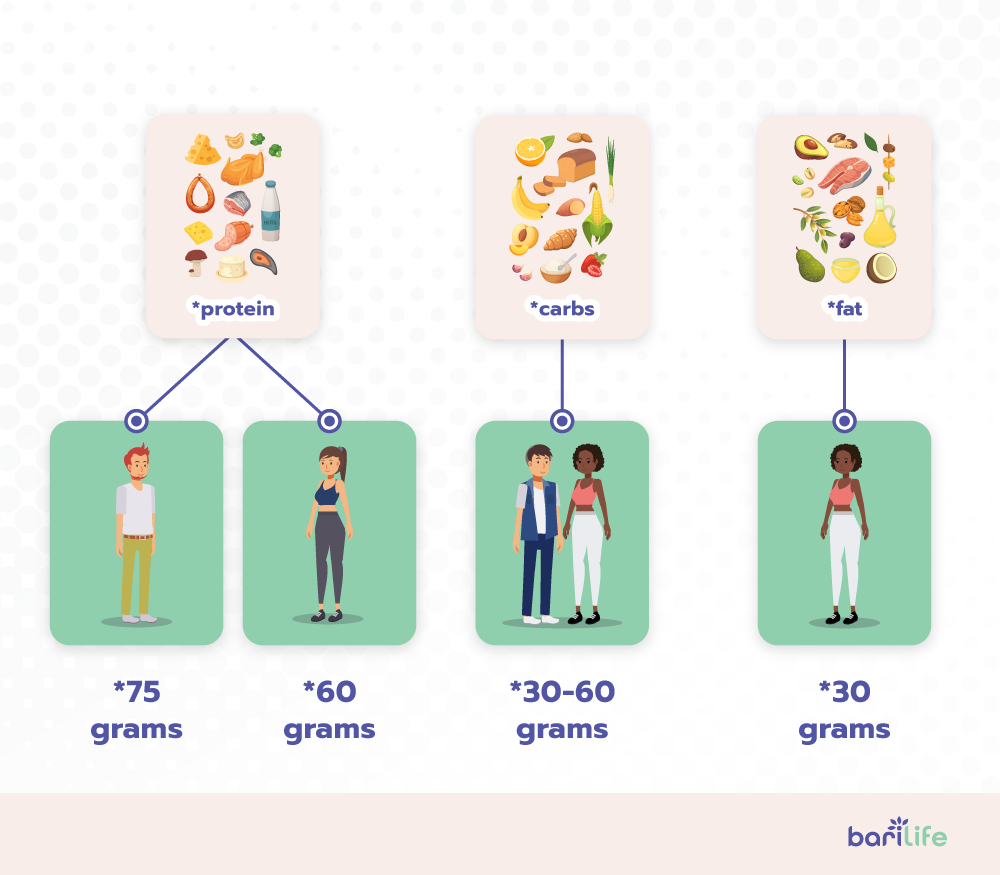
You should focus on healthy foods within each food group and try to reduce the amounts of refined sugars and highly processed foods that you consume. It’s important to remember that your stomach can only hold about 5-6 oz of food following the gastric sleeve so your intake at each meal should stay between 4-6 oz to prevent stretching of sleeve and to prevent weight gain.
The stabilization diet is a Long term diet. It should start about 4-6 months after surgery, and you should continue to follow it for life!
Exercise 10 years after gastric sleeve
You will be cleared to do almost all forms of exercise around 6 months to a year following surgery. However, 10 years after surgery it may be hard to stay motivated to work out regularly.
Your goal should be to work out about 30 min a day 5 times a week! Try to find workout styles that you enjoy and stay consistent. Don’t be afraid to change up your workout style or routine to keep it interesting and to stay engaged.
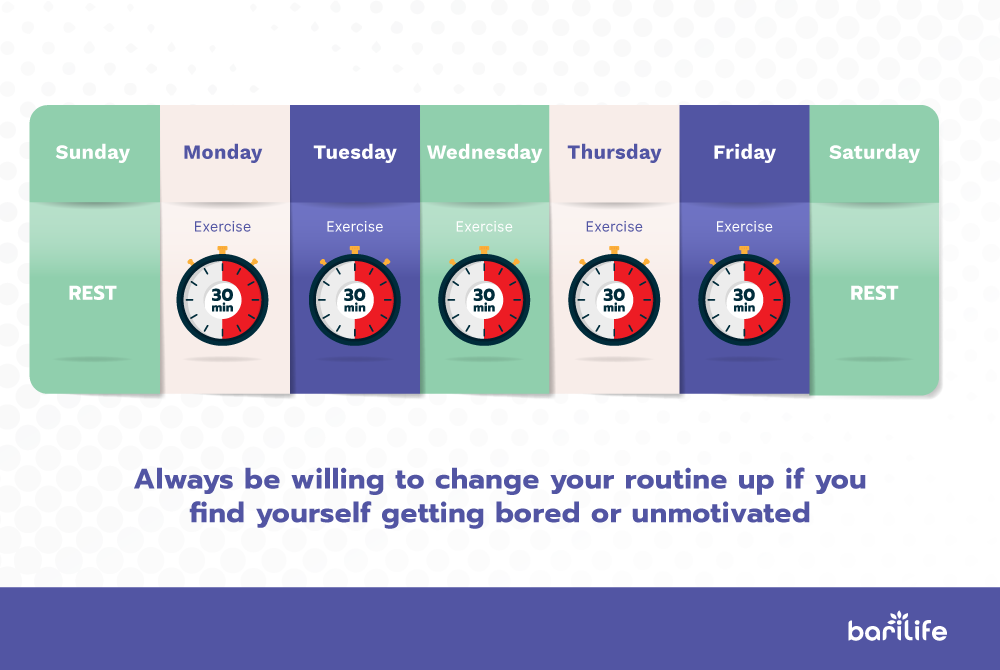
It is important to focus on movement and building muscle after gastric sleeve. Resistance training, bodyweight exercises, and low-impact cardio are great options to try at home or in the gym.
Do I still need to take a multivitamin?
YES! Following the gastric sleeve, you are at an increased risk of nutrient deficiencies (peep long-term complications). You should continue to take multivitamin supplements for life to reduce your risk of these deficiencies.
If you are looking for a great multivitamin designed specifically for bariatric surgery patients then check out our multivitamins!
That’s a wrap
This article briefly touches on many important topics related to the long-term results of the gastric sleeve. If you are interested in learning more about each topic don’t hesitate to click the links in the article or check out our other blog posts!




What are your tips and tricks to post-bariatric success?